Bake Your Research winners raise study, environment and space

This year’s Open University (OU) Graduate School Bake Your Research competition winners have reflected OU priorities in their baking, particularly around the theme of sustainability.
Now in its fifth year, the competition is an opportunity for Postgraduate Researchers to show off their research communication skills by conveying something about their topic in a show-stopping baked form and an accompanying ‘non-technical’ abstract. This year’s event took place on 23 November online via a Padlet gallery with an in-person gathering in the OU’s Library Atrium.
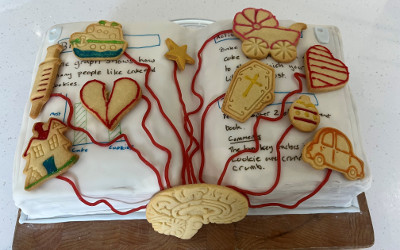
Benefits of taking a study break
The winning entry was a cake titled 'When Life Goes Cookie' by Linda Robson, an EdD researcher in the Faculty of Wellbeing, Education and Language Studies was: An Investigation Into Student Experiences of Taking a Study Break at The Open University and investigated the various life events that get in the way of study and the finding that if students deal with the issues, they can return to study.
Linda said:
“The main cake (chocolate with vanilla buttercream) is an OU module book which represents study. The cookie brain is trying to engage in study, but various life events (vanilla cookies) are getting in the way. Each small cookie represents an issue that was reported by students in interviews about their experience of taking a study break. If students can deal with the issues (eat the cookies) during their study break they will then be able to return to study. If the issue is ongoing at the end of the study break period, they will have to stop studying.”
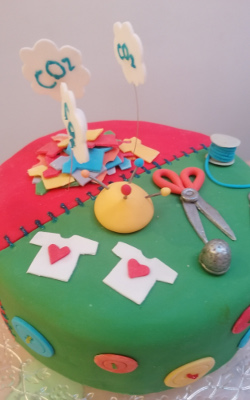
Supporting sustainability
Sustainability is one of the OU’s new Open Societal Challenges themes and it is reflected in the project by the second prize winner, Ismay Mummery, a PhD researcher in the Faculty of Science, Engineering, Technology and Mathematics for a project: Could Repair Events Become a Path Towards a Circular Fashion System.
This research will investigate and analyse the use of communal workshops to ‘fix’ our attachment to unused clothing (Uğur Yavuz, 2022) back into active use through methods of invisible and visible mending through the theoretical lenses of emotional durability and storytelling.
Inside of the cake, titled 'Mending our bonds with clothing', are jelly babies to symbolise that people are at the centre of this idea - a local community solution to a global problem.
The red side represents the problem; a pile of unwanted clothes, rubbish bins and CO2 clouds show textile waste and over consumption and the green side is the solution proposed through the project; local mending events that re-connect people with their clothes.
Ismay said:
“To combat the climate emergency all industries need to reduce greenhouse gas emissions to meet the UK’s net zero target by 2050 (HM Government, 2021). The total emissions from textile production are more than international flights and maritime shipping combined (WRAP, 2017) A solution to reducing emissions is the concept of circular fashion (Ellen MacArthur Foundation, 2020) where resources are maintained for as long as possible through cycles of use and reuse (Goldsworthy and Earley, 2018). For example, extending the life of a garment by 9 months can reduce carbon, water and waste impacts by around 20-30% each (WRAP, 2017)”
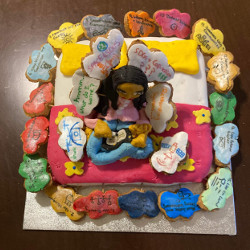
Another sustainable-themed project by Devyani Gajjar, a PhD researcher in the Faculty of Arts and Social Sciences got an Honourable Mention for the Geography project: The Use of Space Technologies in International Development: Opportunities and Challenges, which is investigating whether space applications used in UK aid projects can help achieve the Sustainable Development Goals (SDGs).
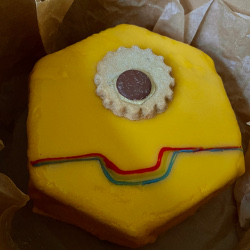
Studying space
In third place was a cake titled 'In a Cake, Far, Far Away by Agnibha (Agni) Banerjee, a PhD researcher in the Faculty of Science, Technology and Mathematics was awarded for a project: Exploring Exo-Venuses with James Webb Space Telescope (JWST).
Agni said:
“Exoplanetary research is buzzing now, with more than 5000 exoplanets confirmed and more on the way. Telescopes like JWST massively increase our ability to study these worlds. Apart from trying to answer the question of whether we are alone in the universe, these studies help us understand more about how planets and atmospheres work in our Solar System. My PhD project is all about using these techniques and data from space telescopes to learn more about exoplanet atmospheres - focussing particularly on Venus-like planets. Sometimes it's also about learning to bake!”
The hexagonal cake represents a section of the JWST (launched last year with a 6.5m mirror and similar to a tennis court in size) primary mirror of the same shape. It's a honey cake to capture the honeycomb design of the whole mirror (+yummy). The icing and honey glaze on top reflects the gold plating of the mirror.
The ginger biscuit on top stands in for a distant star. The chocolate button is a planet passing in front of the star with the ring of honey around it being the planet's atmosphere. The dip in light from the star when the planet transits in front of it is different in different wavelengths (colours) - as the atoms and molecules present in the atmosphere absorb light in different ways. This spectrum of "lightcurves" that are shown using the icing lines allows us to find out what the air on exoplanets (planets outside our solar system) might be like.
OU Graduate School Manager, Robert Wilson said:
“This year we saw bakes that covered topics across all five of the University’s primary research themes and we also saw students use the opportunity to reflect on their experience of doing postgraduate research. The event is a popular fixture in the Graduate School’s calendar, and we’re always really encouraged by all the engagement both online and on-campus.”
You may also be interested in:
Contact our news team
For all out of hours enquiries, please telephone +44 (0)7901 515891
Contact detailsNews & articles
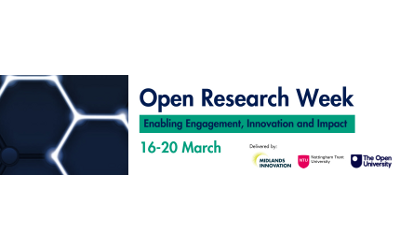
Open Research Week to spotlight innovation in 2026
Open Research Week will return from 16–20 March 2026, uniting Open University researchers and partners to explore how open practices drive engagement, innovation and societal benefit.